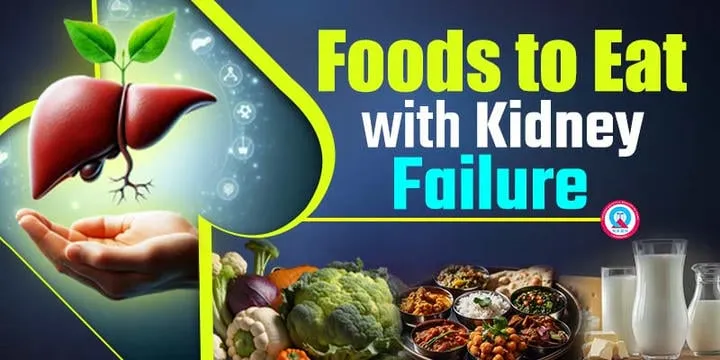
If you’ve received a diagnosis of kidney failure, it might seem as though you’re suddenly inundated with a multitude of "don’ts" regarding your dietary options. Don’t eat this; don’t eat that. However, here’s the encouraging news: there remain numerous foods that are not only permissible for you to savor, but also beneficial for your kidneys! It’s all about selecting the appropriate choices and with some knowledge, you can construct a kidney-friendly diet that tastes delightful. This blog will explore the foods to eat with kidney failure in detail.
Potassium (an essential mineral) is crucial for your muscles and heart; however, when your kidneys aren't functioning properly, it becomes more difficult for your body to eliminate excess potassium. Too much can lead to serious heart problems; this is why maintaining potassium levels in check is key. Although there are concerns, you shouldn't worry too much—because you can still enjoy numerous fruits!
Kidney-friendly options:
These fruits are not only delicious but are also low in potassium: they won’t overload your system. Enjoy them as snacks, in smoothies, or (this) as a fresh topping for oatmeal or yogurt, because they provide a healthy alternative. You would not get better foods to eat with kidney failure than low-potassium fruits.
When you experience kidney failure, it’s important not to overdo it on protein; too much can strain your kidneys. However, your body still needs some protein to maintain muscle and overall health. The trick is to consume moderate portions of high-quality, lean protein; this is crucial. Although it may seem challenging, you can still find a balance that works for you, because moderation is key.
Kidney-friendly options:
These are great sources of protein that won't overwork your kidneys, especially when consumed in the right amounts. Plus, they’re easy to cook and super versatile. You can grill chicken, bake some fish, or make a quick egg scramble for breakfast; yum! However, one must be cautious about overindulgence (because) moderation is key, although the options seem endless.
Whole grains are fantastic sources of energy and fiber; they’re great for digestion. However, when your kidneys are struggling, they can help with things like controlling blood sugar and blood pressure. Although you might need to limit some grains if you have kidney failure (especially those with higher phosphorus content), there are plenty of good choices out there. This is important because it allows individuals to maintain a balanced diet.
Kidney-friendly options:
Whole grains are easy to incorporate into your meals; however, they won’t overload your kidneys with excessive phosphorus. The trick is to choose white versions of grains, which are lower in phosphorus than their whole-grain counterparts. Although this might seem counterintuitive, it's beneficial because it allows for a balanced diet without compromising kidney health.
Fats serve as great sources of energy; however, if you’re navigating kidney failure, you don’t necessarily have to eliminate them. You simply want to ensure you’re consuming the appropriate types of fats. Focus on healthy fats which can aid in reducing inflammation and support heart health (because this is crucial for overall well-being).
Kidney-friendly options:
Healthy fats are delightful and will enhance your body's functioning more effectively without inducing stress on your kidneys. Just remember, moderation is key when it pertains to nuts and seeds, due to their phosphorus content.
Veggies are full of nutrients and fiber; they should be part of your kidney-friendly diet. However, potassium is the name of the game (this is crucial), so you want to opt for those lower in potassium. Although there are plenty of veggies that fit the bill, they are also super tasty too!
Kidney-friendly options:
These vegetables (light on potassium) are packed with vitamins; thus, you can enjoy them raw, roasted, steamed, or sautéed. Add them to your meals and feel good knowing you're eating foods that won’t add stress to your kidneys (because this is essential).
Seasoning (your food) can make a huge difference in taste; however, when you’re on a kidney-friendly diet, it’s important to utilize herbs and spices instead of salt. Salt can contribute to fluid retention (and) high blood pressure, which puts extra strain on your kidneys.
Kidney-friendly options:
These natural flavor enhancers can transform a simple dish into something truly delectable without adding any sodium, however, one need not worry about potential kidney damage. Although the flavor may be enhanced, this does not compromise health; rather, it elevates the culinary experience.
If your renal functions are deteriorating, then arresting that decline at the earliest will mean a brighter prognosis. Apart from the traditional treatment, Ayurvedic treatment for kidney failure has also been gaining traction amongst patients. Reputed Ayurvedic hospitals like Karma Ayurveda offer reliable and high-quality natural treatment for kidney failure. The hospital also engages in offering diet and lifestyle changes for the overall improvement of the patient’s health. Quick detection and swift treatment allow you the space for effectively treating the underlying causes of the disease, leading to fewer health complications.
Eating while having kidney failure doesn’t mean you are relegated to tasteless food. With a tinge of creativity, one can indulge in a wide array of delectable meals while still safeguarding your kidneys. Although these tips can set you on the right path, this journey toward better eating for your kidneys and enhancing your overall well-being is just the beginning!
Second Floor, 77, Block C, Tarun Enclave, Pitampura, New Delhi, Delhi, 110034